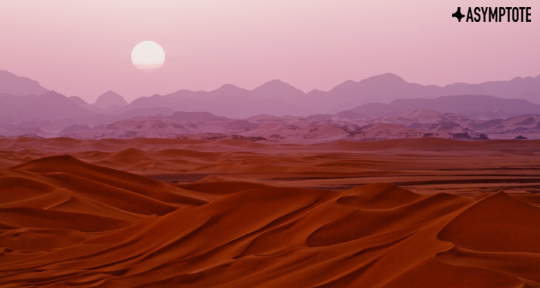Emptiness, desolation, and thirst—these evocations of the desert are the ones most familiar to the bulk of us, but for some, this wild landscape resists such simple evaluations, holding instead a kingdom of history, knowledge, and narrative. In this essay, anthropologist and writer MK Harb takes us through the literature of the North African author Ibrahim Al-koni, whose sagas reveal the historic philosophy that these regions have preserved. Despite the othering hierarchical nature that has plagued literature, Al-koni’s writings invoke tender and human shapes from his landscapes, arising from that mysterious creature: the Sahara.
MK Harb recommends listening to this playlist while reading this article and the works of Al-Koni.
The mahri convulsed and its skin turned bloody red. It jittered with pain, its stomach containing a fire burning within and howled “Aw-a-a-a-a-a-a-a.”
Ukhayadd had given the mahri a silphium plant known for its magical capabilities for physical healing, but also for its mind-twisting qualities. Ukhayadd himself began to convulse, through his emotions he felt every bit of the pain the mahri was going through. He pleaded to the various gods in the Sahara from Allah to those guarding the temples to transfer the pain on to him. He yelled “Lord, divide his share of pain. Let me be the one to lighten his burden,” but the mahri still jittered and yelled “Awa-a-a-a-a-a-a.”
Ukhayadd’s emotions then turned to anger. He pleaded with the mahri, yelling “do you think you can escape your fate? Brave men do not try to run from themselves. Wise men do not try to flee from fate.” Ukhayadd did not see the mahri as a horse. He shared with him a sort of otherworldly love and addressed him with the various emotional capacities you would with a human.
This imagery ripe with lore and the transfiguration of pain comes to us through the words of the novelist Ibrahim Al-koni. Al-koni is a prolific writer, having penned over eighty novels, with his most famous being The Bleeding of the Stone (translated by May Jayyusi) and Desert Gold (translated by Elliot Kolla), from which this preceding passage of Ukhayyad and the mahri comes. Al-koni hails from Libya, though he does not identify as a Libyan author; while he comes from the land that is now nationally defined as Libya, he is unwilling to commit to nationalist or modern labels. Having grown up in the traditions of the Tuareg, an Amazigh group that inhabits the borders in and out of the Sahara and whose cultural and geographic traditions were heavily disrupted by the imposition of colonial and national borders, this nomadic upbringing seeps throughout his words. His writing is divorced from a need to construct urban environments or a sense of linear time and space; instead, it is imbued with a Sahrawi melancholy, which conjures up vast plateaus that are full of events as enthralling as those unfolding in cities.

